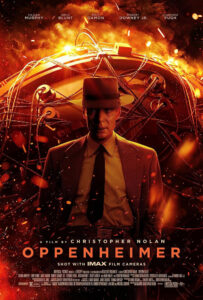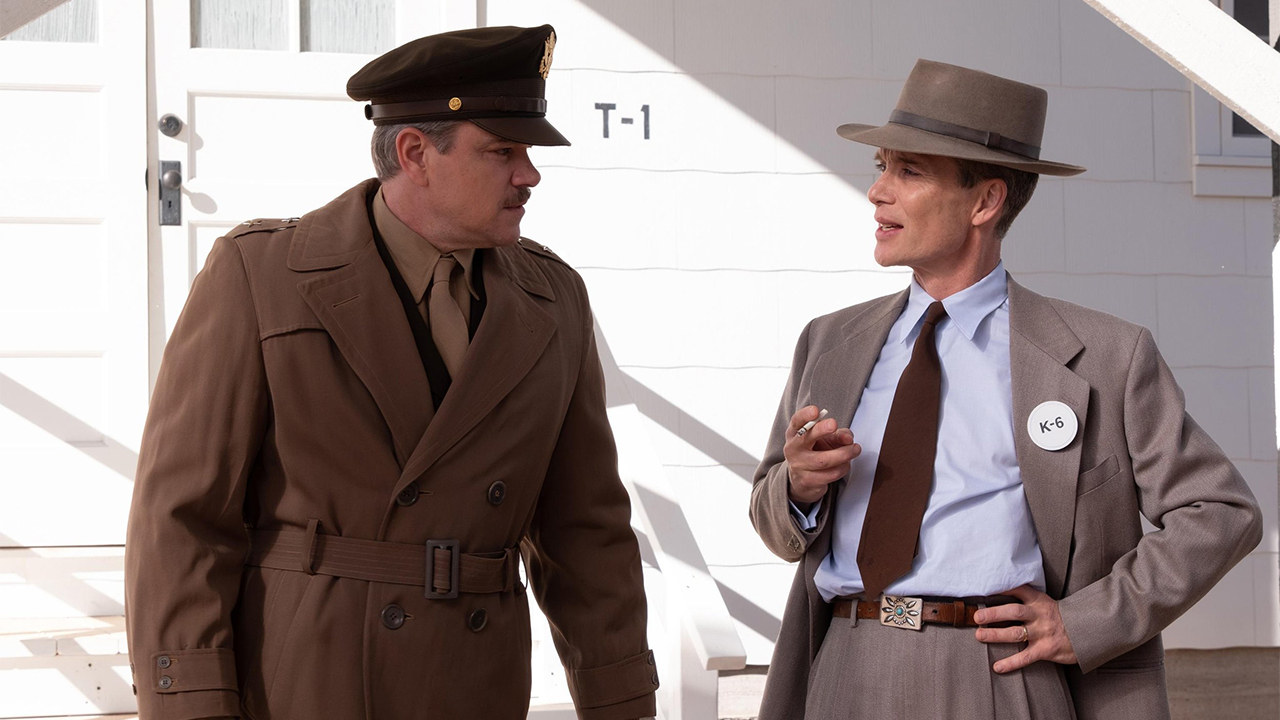Oppenheimer (2023)
Film and Plot Synopsis
Written and directed by Christopher Nolan, Oppenheimer is an IMAX®-shot epic thriller that thrusts audiences into the pulse-pounding paradox of the enigmatic man who must risk destroying the world in order to save it. The film stars Cillian Murphy as J. Robert Oppenheimer and Emily Blunt as his wife, biologist and botanist Katherine “Kitty” Oppenheimer. Oscar® winner Matt Damon portrays General Leslie Groves Jr., director of the Manhattan Project, and Robert Downey, Jr. plays Lewis Strauss, a founding commissioner of the U.S. Atomic Energy Commission. The film is based on the Pulitzer Prize-winning book American Prometheus: The Triumph and Tragedy of J. Robert Oppenheimer by Kai Bird and the late Martin J. Sherwin. The film is produced by Emma Thomas, Atlas Entertainment’s Charles Roven and Christopher Nolan. (Courtesy of Universal Pictures)
‘Oppenheimer’ Movie Summary
 J. Robert Oppenheimer (Cillian Murphy) is a 22-year-old doctoral student at the University of Cambridge in 1926. Oppenheimer is studying under experimental physicist Patrick Blackett (James D’Arcy) at the Cavendish Laboratory. The young Oppenheimer struggles with homesickness and anxiety and finds himself at the receiving end of criticisms from Dr. Blackett. An overwhelmed Oppenheimer responds by poisoning an apple and leaving it for Blackett to eat. However, when Oppenheimer sees that a visiting scientist, Dr. Niels Bohr (Kenneth Branagh), is possibly going to eat the apple, Oppenheimer takes the apple and throws it away. During the conversation, Dr. Bohr encourages Oppenheimer to study theoretical physics at the University of Göttingen instead.
J. Robert Oppenheimer (Cillian Murphy) is a 22-year-old doctoral student at the University of Cambridge in 1926. Oppenheimer is studying under experimental physicist Patrick Blackett (James D’Arcy) at the Cavendish Laboratory. The young Oppenheimer struggles with homesickness and anxiety and finds himself at the receiving end of criticisms from Dr. Blackett. An overwhelmed Oppenheimer responds by poisoning an apple and leaving it for Blackett to eat. However, when Oppenheimer sees that a visiting scientist, Dr. Niels Bohr (Kenneth Branagh), is possibly going to eat the apple, Oppenheimer takes the apple and throws it away. During the conversation, Dr. Bohr encourages Oppenheimer to study theoretical physics at the University of Göttingen instead.
A few years later, Oppenheimer completes his PhD at Göttingen. While attending college he meets fellow scientist Isidor Isaac Rabi (David Krumholtz). The two men later meet theoretical physicist Werner Heisenberg (Matthias Schweighöfer) in Switzerland, and the three men discuss issues of theoretical quantum physics. After graduating, Oppenheimer heads to the United States in order to expand research in the area of quantum physics. He begins teaching at the University of California in Berkeley and the California Institute of Technology. While there, Oppenheimer begins a sexual relationship with psychiatrist Jean Tatlock (Florence Pugh). Tatlock is a member of the communist party who suffers from her own mental health issues. Not long after, Oppenheimer meets Katherine “Kitty” Puening (Emily Blunt) at a party. Kitty is a biologist and an ex-communist who is unhappy with her current husband. Kitty and Oppenheimer also begin an affair which results in Kitty divorcing her husband. A brief time later, Oppenheimer and Kitty are married, although Oppenheimer continues to see Tatlock on the side.
In December of 1938, nuclear fission is discovered in Sweden which opens up a whole new world of possibilities. Oppenheimer realizes that the energy released from nuclear fission could be weaponized. Oppenheimer is approached by United States Army Colonel Leslie Groves (Matt Damon) in 1942 to ascertain whether Oppenheimer would be suitable to become the director of the secret Manhattan Project, the United States codename for the program to develop an atomic bomb. Groves decides that Oppenheimer is a controllable pick for the project, and the two men work together to recruit a group of scientists to work in secret, with their families, at a secret facility in the desert of New Mexico. Oppenheimer, who is Jewish, is concerned that Heisenberg, who is leading the German nuclear research program, will successfully develop a fission bomb for the Nazis before Oppenheimer’s group can complete their mission.
Oppenheimer recruits his team from around the United States. Rabi, Hans Bethe (Gustaf Skarsgård), and Edward Teller (Benny Safdie) join as part of the team working in secret at the Los Alamos Laboratory. The scientists are allowed to bring their families and the military builds a town to support the population at the facility. Oppenheimer also recruits and collaborates with a team of scientists working at the University of Chicago, specifically Enrico Fermi (Danny Deferrari), Leo Szilard (Máté Haumann), and David L. Hill (Rami Malek). Teller’s research and calculations reveal that an atomic detonation could potentially trigger a catastrophic chain reaction that would ignite the atmosphere and destroy the world. Oppenheimer takes the research and consults with Albert Einstein (Tom Conti), who is not in support of the development of the weapon. Oppenheimer concludes the chances of destruction are acceptably low and continues with the project. Teller proposes to construct a hydrogen bomb at the same time, but Oppenheimer rejects the idea. Teller attempts to leave the project, but Oppenheimer convinces him to stay. While the project is ongoing, Oppenheimer learns that Tatlock has killed herself due to her mental health issues.
They won’t fear it until they understand it. And they won’t understand it until they’ve used it. Theory will take you only so far. J. Robert Oppenheimer (Cillian Murphy)
The development continues into 1945. However, after Hitler’s death, some of the project’s scientists begin to question the need for the bomb and circulate a petition that requests that the United States government inform Japan of the bomb and request their surrender before the bomb can be dropped. Oppenheimer disagrees with the petition and believes that the bomb would end the ongoing war in the Pacific and ultimately save lives. The development of the bomb continues, and Oppenheimer has a successful detonation with the Trinity test. Following the test, President Harry S. Truman (Gary Oldman) quickly orders the atomic bombings on Hiroshima and Nagasaki. The bombings are successful in inducing Japan to surrender and bringing World War II to a close. However, Oppenheimer is haunted by the mass destruction and loss of life as the bomb kills more people than the scientists predicted. In contrast, Oppenheimer is publicly praised. Oppenheimer meets with President Truman and expresses his personal guilt. Truman berates Oppenheimer as the President considers himself responsible for the decision to drop the bombs. Oppenheimer attempts to encourage Truman to restrict further nuclear weapons development which the President dismisses out of hand.
After the war, Oppenheimer remains as an advisor to the United States Atomic Energy Commission (AEC). However, Oppenheimer’s stance on nuclear weapons development generates controversy while Teller’s plans for a hydrogen bomb receives renewed interest in the heat of the newly begun Cold War. The AEC Chairman, Lewis Strauss (Robert Downey Jr.), holds a secret, personal grudge against Oppenheimer after the renowned scientist publicly humiliates Strauss by dismissing Strauss’ concern about exporting radioisotopes and for recommending negotiations with the Soviet Union after they successfully detonate their own bomb. Strauss also mistakenly believes that Oppenheimer denigrated him to Einstein during a conversation in 1947.
Then, in 1954, Strauss implements a plan to secretly eliminate Oppenheimer’s political influence. Strauss orchestrates a private security hearing before a Personnel Security Board concerning Oppenheimer’s top-secret clearance. The hearing is all for show and has a predetermined outcome. Oppenheimer and his attorneys are at a decided disadvantage. Oppenheimer’s past communist ties are called into question. Former colleagues and co-workers’, including Colonel Groves, past opinions and testimony are twisted and used against Oppenheimer. Teller is called to testify and informs the panel that he lacks confidence in his former colleague and recommends revocation. At the conclusion of the hearing, the board revokes Oppenheimer’s top-secret clearance. The revocation damages Oppenheimer’s public image and cripples his ability to influence United States nuclear policy.
Five years later, Strauss is nominated for Secretary of Commerce by the President. Strauss’ Senate confirmation hearing appears to be a rubber stamp for his appointment until Hill testifies about Strauss’ personal motives in engineering Oppenheimer’s ultimate downfall. The revelation derails Strauss’ plans and results in the Senate voting against his appointment. In 1963, President Lyndon B. Johnson presents Oppenheimer with the Enrico Fermi Award which is the equivalent of Oppenheimer’s political rehabilitation.
A flashback reveals the conversation between Oppenheimer and Einstein that Strauss mistakenly believes Oppenheimer denigrated him at. During the conversation, Oppenheimer expresses concern that although their use of the bomb did not result in the end of the world, their creation of the bomb may have started a chain reaction, a nuclear arms race, which would one day destroy the world. A disturbed Einstein walked away dazed where he mistakenly forgot to acknowledge Strauss.
Rate the Film!
Our Rating
Universal Pictures released Oppenheimer on July 21, 2023. Christopher Nolan directed the film starring Cillian Murphy, Emily Blunt, and Matt Damon.
